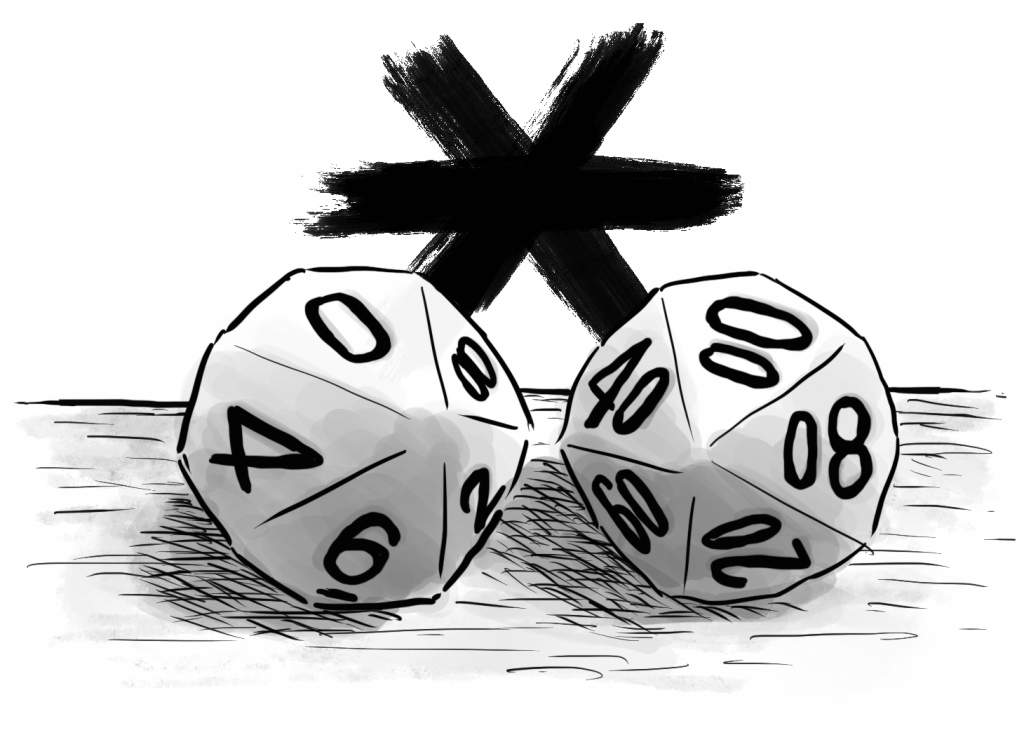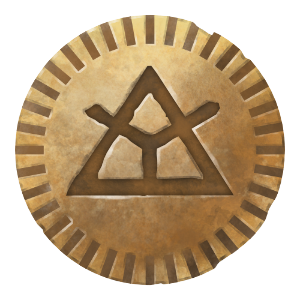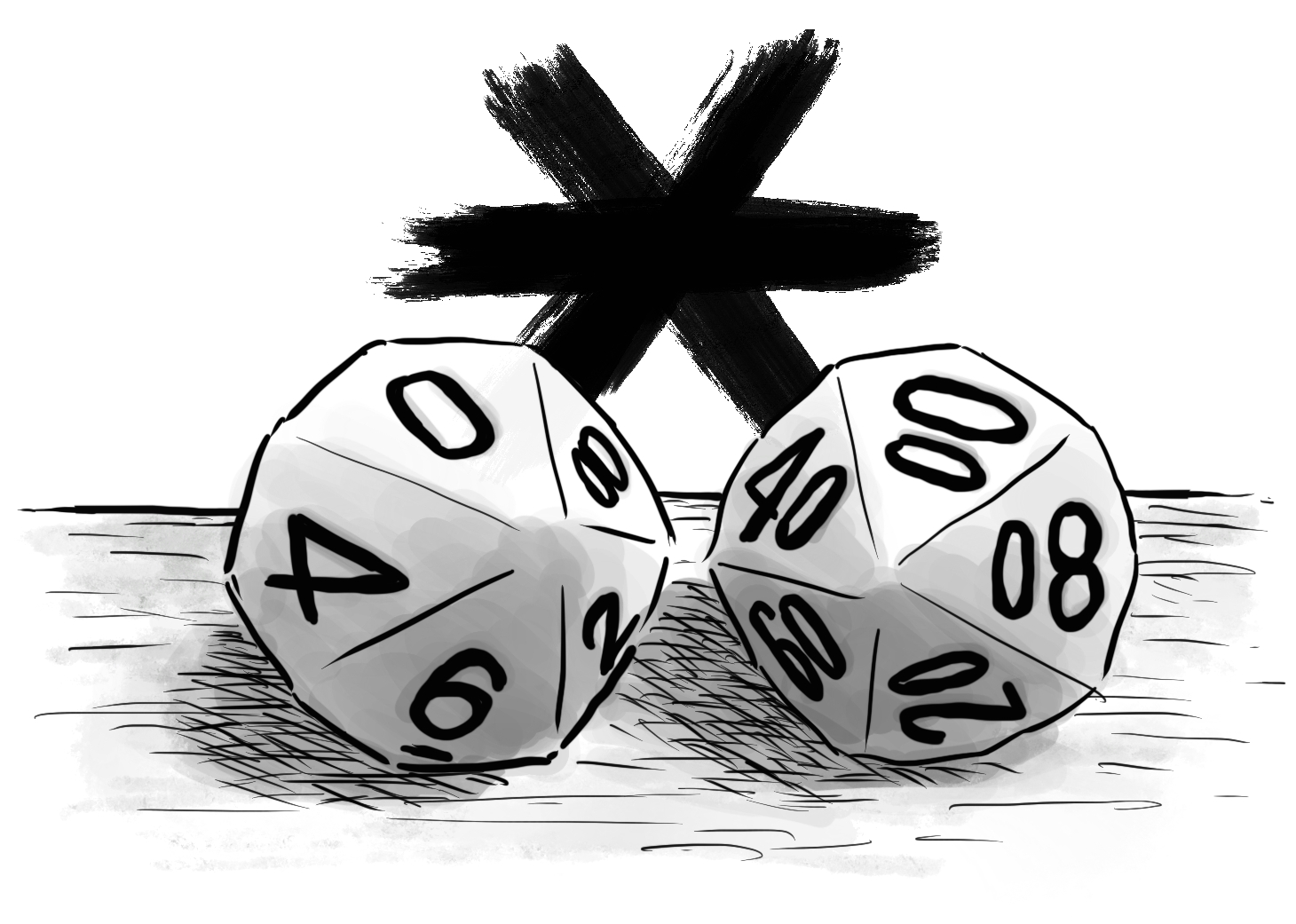
Runic Rants is an irregular series of thoughts, opinions, and experiments about RuneQuest.
It’s kind of funny: BRP games like Call of Cthulhu or RuneQuest are among my all time favourite RPGs, but BRP itself is not even close to my top 5 systems. One of the reasons for this is the split between characteristics and skills, which don’t interact much with each other. I’m a kid of the 90s: characteristics and skills are meant to be added together, damn it!
Anyway, this split means that the gamemaster needs to decide when to ask for characteristic rolls, when to ask for skill rolls, and what to do when both could apply. Here are some thoughts.
The Easy Ones: STR, CON, SIZ, POW
The first three characteristics are easy because they don’t really compete with any other abilities: there’s no skill for raw strength like kicking a door down (STR), resisting poison, fatigue, or harsh environmental conditions (CON), or being lucky or strong-willed (POW). So these should be easy to use at the table.
Interestingly enough, RuneQuest doesn’t mention POW or SIZ rolls on page 141, like it does for the other characteristics…
- For POW, it’s maybe because the magic rules are already using POWx5 rolls often enough, or because, unlike other characteristics, POW is meant to go up and down quite a lot, making it unreliable to use consistently during play.
- For SIZ, it’s just hard to imagine when that can be useful… but I’ve heard of SIZx5 being used to augment Intimidate!
DEX
With DEX we start to hit the problem of skills competing with a characteristic. There’s a dozen skills for all kinds of actions based on agility or manipulation, so what’s left for DEX itself?
Frankly, I can’t recall any other situation besides bad footing and balance: I would make players roll DEXx5 or DEXx3 during an action scene where the ground is difficult to run around on, or their character is in an unstable situation. One of my players also once used it when two characters raced to grab their weapons, making a DEX roll to see who grabbed them first. And of course some spells like Illusory Motion or Shake Earth require DEX rolls from the casters or victims.
If we look at the rulebook, the chase rules call for DEX rolls to see who is fastest, while the falling rules specify a DEX roll to land on a specific hit location. There is also a mention of a DEX roll for throwing a simple object at a target (such as throwing a rock to create a diversion), or catching it. But catching objects can also be done with a Sleight skill check, so the gamemaster might be met with the classic (at least for me) player request to roll under their characteristic instead of their skill… at least until Sleight is increased above DEXx3 or DEXx5. We’ll get back to that problem later.
INT
There are even more knowledge skills than agility and manipulation skills combined, but we can consider INT as raw memory, intuition, and logic. So I sometimes let players roll INTx3 or INTx5 to remember something an NPC said to their character, such as instructions or directions, or to have some revelation about “what’s really going on”, such as a conspiracy against the King or discerning reality from visions.
CHA
This is the one that I had the most problem wrapping my head around. CHA is supposed to represent how charming a character is, or how much of a natural-born leader they are, but there are already skills like Charm or Orate!
Moreover, figuring out when CHA rolls can be used is particularly important if you consider spells like Glamour or Charisma. You have combat Rune spells that can double your weapon skill or more, but these two spells only gives you, like, a +15% bonus to communication skills or something? How is that worth casting when you can get more for free with a simple augment? These CHA-boosting spells must be good for something, right?
I couldn’t figure out when it was ever OK to use CHA rolls until I checked the “Skill and Ability Time” section (RuneQuest page 139). Skills like Fast-Talk or Bargain usually take a minute or more, according to this list, and skills like Charm take 5 minutes or more. So one way to look at it is that a CHA roll is for anything that’s faster than all of these: between a few seconds and a melee round. CHA is how you get things done quick: getting past a guard (unless the guard is bored or patient enough to listen to someone yap for two minutes!), getting some bystanders to help during an action scene (the character probably only spends one round on this!), or postponing an execution (“wait, no, don’t kill him yet, there’s something you need to know!”).
So in my opinion CHA is what makes people pay attention to you. With a very high CHA, you can get people to look at you, to listen to you, or to follow you… but then you have to back it up with actual skill. You might have gotten the King’s attention, but you have to follow it up with an Orate or Battle roll to convince him that an alliance with the Telmori is needed to win. You might have gotten the soldiers to follow you in a surprise flank maneuver, but you have to show some fighting prowess or they will lose faith and retreat. You might have postponed the execution, only to find your arguments rejected and the prisoner beheaded.
Success At A Cost
There are still situations where a player might ask for a characteristic roll instead of a skill roll. In my Call of Cthulhu days, this might happen because of a dramatic scene in a previous session in which I made a ruling on the fly to roll some characteristic to make things interesting… only to realize that it set a precedent of sorts!
So I started to consider characteristic rolls as “less good” than skills rolls. By definition, they often represent a “brute” approach to problem solving, rather than one based on knowledge and experience. The idea is to make characteristic rolls a good fallback plan, but keep skills as the best thing you can use. In this approach, characteristic rolls would have the following downsides:
- Obviously, succeeding with a characteristic roll doesn’t give you an experience check. You don’t learn from the experience.
- A successful characteristic roll should be a “success at a cost”, i.e. a success that isn’t as good as a success with a equivalent skill (if any).
So for example:
- Kicking down a door would alert a guard, while lock-picking it would not.
- Keeping your balance on a boat with a DEXx3 roll might still give you a small penalty to all rolls. By comparison, succeeding with a Boat roll, showing actual experience with sailing, would remove all penalties.
I generally don’t have to think about these things unless they come up with a specific player. If we take the example of the adventurers being on a boat, I might start with a DEX roll to keep their balance, only to realize that one adventurer has the Boat skill, and the others don’t. I would probably want to give that player an advantage for that, therefore adjusting the ruling on the fly to make DEX rolls not as good.

Do you have examples of using characteristic rolls in interesting ways? Please share them!
If you have any comment about this Runic Rant, or some ideas for a future installment, please send them to us!



One comment on “Runic Rants: Characteristic vs Skills”